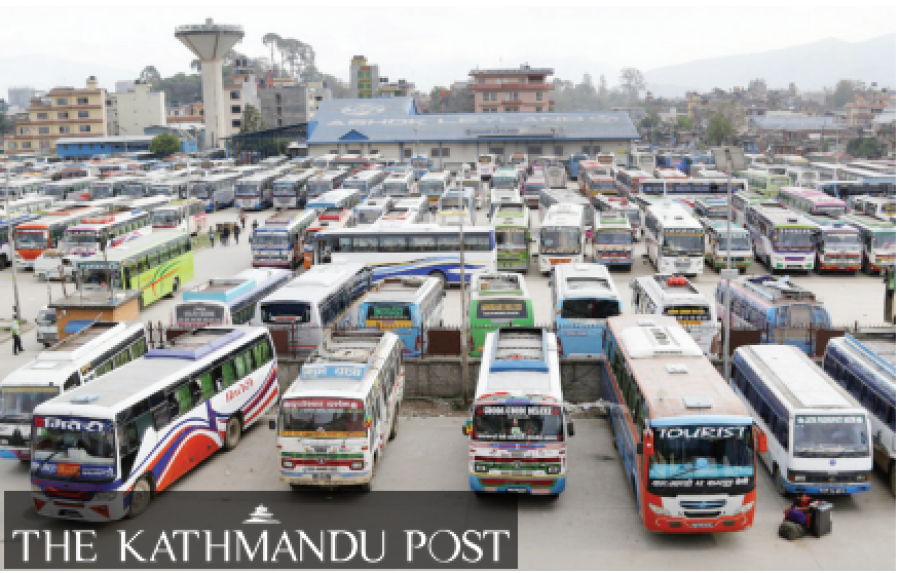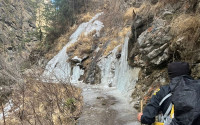National
Ban on long-route transport lifted amid virus concerns
The virus will now travel to the remote places of Nepal where the numbers of Covid-19 cases are fewer, says Dr Pun of Teku Hospital.
Shuvam Dhungana
On Friday, the District Administration Office, Kathmandu issued a notice urging public bus operators to make arrangements for the operation of medium- and long-distance transport services by following health safety protocols.
The notice stated that as exams of the Tribhuvan University and the Public Service Commission were going to take place, the decision was taken to facilitate the movement of the examinees as well as the general public.
However, according to Chief District Officer Kali Prasad Parajuli, the points mentioned in the notice are not the only reasons for allowing operation of long-route vehicles.
“We have also received complaints from the public that despite the restrictions in place, some transporters were carrying passengers on long routes by charging them exorbitant fees,” said Parajuli.
“As people were travelling to their preferred destinations anyhow by paying extra, we allowed long-route vehicles to operate officially so that people do not have to pay hefty amounts.”
While long-route vehicles remain garaged for nearly three months due to the prohibitory orders, several reports suggest that some unscrupulous operators of small vehicles have been serving long routes and charging passengers up to four times the normal fares.
Deputy Superintendent of Police Sunil Jung Shah at the Traffic Police Division in Kathmandu also confirmed that some people were carrying passengers in private vehicles by charging expensive fares.
“We have taken action against over 100 people for illegally operating on long routes and fleecing passengers,” said Shah.
The notice issued by the District Administration Office, Kathmandu also urges the public to buy tickets from official ticket counters only.
According to Parajuli, they have instructed the traffic police to monitor if the vehicles are following the health safety measures.
“We will also ensure that the long-route vehicles are carrying passengers not more than what they can seat and they are not being overcharged.”
Despite assurances by the authorities that health safety protocols would be strictly enforced on long-route vehicles, there are concerns to the contrary as the authorities have paid little attention to effectively enforcing the restrictions.
As permission has been given for the resumption of long-route transport services, public health experts have warned of a possible catastrophe as Nepal’s case positivity rate is still too high and the percentage of fully immunised people against the coronavirus is very low at four percent.
The loosening of the restrictions has already increased crowds at public places and people are behaving as if the pandemic is over.
According to Dr Sher Bahadur Pun, clinical research chief at Sukraraj Tropical and Infectious Disease Hospital, with the resumption of long-route transport services, the virus will now travel to the remote places of Nepal where the number of Covid-19 cases is fewer.
“Despite knowing that one should observe basic health safety measures like wearing masks and washing hands to keep the virus away, people tend to ignore these rules and continue socialising thinking that their known persons or relatives are not infected,” said Pun.
Pun believes that it will be difficult to enforce health safety protocols on long-route vehicles as people will eat dinners in groups compromising their safety.
“After a gap of some months, I personally have started getting calls again from my relatives and known people who are reinfected. They ask me ways to deal with it,” said Pun.
Nepal on Friday reported 1,982 new coronavirus cases taking the nationwide infection tally to 676,708, according to the Health Ministry.
Close to 1,000 people tested positive in a total of 3,610 antigen tests.
In its regular situation report, the ministry did not mention the death toll over the past 24 hours. It, however, reported 18 Covid-19-related fatalities, which included the number of deaths managed by Nepal Army on different dates.
The nationwide death toll has now reached 9,679. The number of active cases stands at 27,661.




 11.84°C Kathmandu
11.84°C Kathmandu













